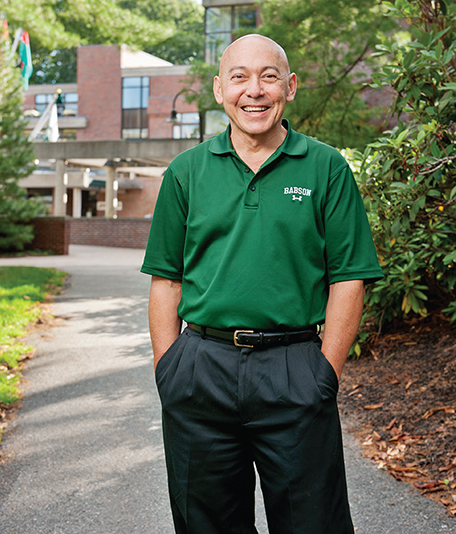
Photo: Webb Chappell
Fred Nanni, provost
To many on the Babson campus, Fred Nanni is a warm, familiar presence. For more than 21 years, he has contributed to the College community as a professor, researcher, mentor, and forward thinker. Now, as the recently appointed provost, he plans to share his knowledge and experience in a new role, helping to oversee and guide the Undergraduate and Graduate schools as Babson moves toward its centennial celebration.
Why did you originally come to Babson? Babson has a different philosophy from most colleges and universities. It’s a place that really honors the teaching mission and honors students. Babson professors want to be involved with their students. That was the attraction. I wanted to be in a place where I could take my talents and my knowledge and my scholarly activity, but also be very focused on the teaching mission.
I think Babson is one of the schools that is a model for what higher education in the 21st century will look like. It’s what I call a high-touch, interactive model. We take an integrated, collaborative approach to teaching. It’s not how can I get students to learn what I know, but how can we help them take their role in the world after they graduate. Yes, we teach basics as part of the process, but it’s not so much about facts. It’s not memorization. These days, students can ask their phone a question and get “the facts.” It’s how to be a critical thinker and how to think logically. How to look at a situation and say, hmm, what opportunities might this present to me? It’s not just the old phrase of how can I think outside of the box, but also how can I change the shape of the box.
What made you interested in being provost? I wanted to preserve the culture at Babson. We have a lot of people who are quickly approaching retirement. The outside world doesn’t do anything like what we do here. I wanted to make sure that we were developing programs that as people come in, we get them involved and give them opportunities right away to be in an integrated environment, and make sure that they understand that that’s an important and recognized characteristic for faculty members.
Can you talk about any plans you have? We’re approaching our centennial, and as part of that process we’re trying to formulate what our view of the future is. We’ve put together a draft of the academic master plan. Right now, it has a lot of what I’ll call ingredients. The committee that oversaw putting it together did a nice job of taking those ingredients and saying here’s the notion of what the dish should look like. So now the time has come to actually turn that into something that is cohesive that we can bring to the trustees and get them to say, yes, we bless this.
There are a lot of little pieces that we need to be putting into place as well. For example, one thing that I’ve been thinking about a lot is the way that we support scholarly work. We need a stronger set of support mechanisms. We also need to start thinking about what the 21st century library will look like. It’s a place for turning data into information—and what are the mechanisms through which we do that—for faculty and students.
What is something that most people don’t know about you? I am on the board of directors of a small youth circus called Circus Smirkus. We went to see a Circus Smirkus show about 15 years ago. My daughter was very small at the time, and we were just blown away. It was incredible, and it energized my daughter. She went to Smirkus camp and was on the tour for three years. So that’s how I got involved.
Circus Smirkus has a program where we send circus people into schools, and for a small fee they show up for a week and get kids pumped up on doing things like tumbling. Then we run a summer camp, but the ultimate thing is we have a tour, so it’s like a super camp. Kids audition, and then train and go on tour. There are about 65 to 70 shows throughout New England. It’s a great confidence builder for those kids. —Donna Coco
